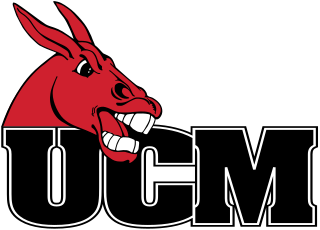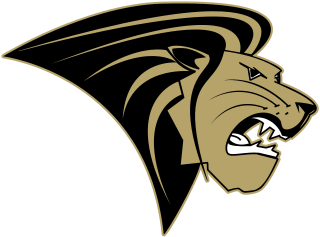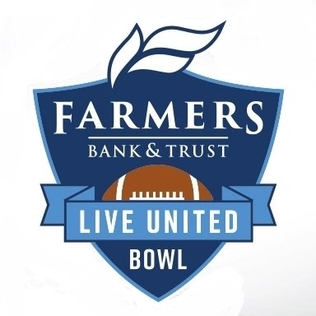
The Mid-America Intercollegiate Athletics Association (MIAA) is a college athletic conference affiliated with the National Collegiate Athletic Association (NCAA) at the Division II level, headquartered in Kansas City, Missouri. Its fourteen member institutions, of which all but one are public schools, are located in Arkansas, Kansas, Missouri, Nebraska, and Oklahoma. The MIAA is a 501(c)(3) nonprofit organization incorporated in Missouri.

The Dixie Rotary Bowl was a college football bowl game initiated by the Rotary Club of St. George, Utah, and first played in 1986 at Greater Zion Stadium, the home field of Utah Tech University's predecessor institution, Dixie State Junior College. From 1986 to 2005, the game was a junior college bowl sanctioned by the National Junior College Athletic Association, featuring top NJCAA teams. The bowl was a NCAA Division II game from 2006 through 2008 after Dixie State became a four-year college and transitioned to Division II. The game was canceled before the beginning of the 2009 season, after the home team had failed to appear in consecutive seasons, reducing local interest.

The Central Missouri Mules and Jennies are the athletic teams that represent the University of Central Missouri, located in Warrensburg, Missouri, in intercollegiate sports at the Division II level of the National Collegiate Athletic Association (NCAA). Central Missouri has primarily competed in the Mid-America Intercollegiate Athletics Association since its founding in the 1912–13 academic year.

The Washburn Ichabods are the athletic teams that represent Washburn University, located in Topeka, Kansas, in intercollegiate sports as a member of the NCAA Division II ranks, primarily competing in the Mid-America Intercollegiate Athletics Association (MIAA) since the 1989–90 academic year. The Ichabods previously competed in the Central States Intercollegiate Conference (CSIC) of the National Association of Intercollegiate Athletics (NAIA) from 1976–77 to 1988–89; in the Great Plains Athletic Conference (GPAC) from 1972–73 to 1975–76; in the Rocky Mountain Athletic Conference (RMAC) from 1968–69 to 1971–72; in the Central Intercollegiate Athletic Conference (CIC) from 1940–41 to 1967–68 ; as an Independent from 1933–34 to 1939–40; and in the Kansas Collegiate Athletic Conference (KCAC) from 1902–03 to 1922–23.

The Lindenwood Lions and Lady Lions are the intercollegiate athletic teams that represent Lindenwood University, located in St. Charles, Missouri, in intercollegiate sports as a member of the NCAA Division I ranks, primarily competing in the Ohio Valley Conference for most of its sports since the 2022–23 academic year.
The Lindenwood Lions football team represents Lindenwood University in football. Lindenwood is a member of the Ohio Valley Conference (OVC). The Lions were provisional members of the NCAA Division I FCS for the 2022 season before becoming an active member during the 2023–2024 academic year.

The Kanza Bowl was an American NCAA Division II college football bowl game between teams from the Lone Star Conference (LSC) and the Mid-America Intercollegiate Athletics Association (MIAA). The game was played on the first Saturday of December from 2009 through 2012 in Topeka, Kansas. In 2010, it was rebranded as the Lower Inc. Kanza Bowl after being sponsored by local plumbing company Lower Inc.

The Northwest Missouri State−Pittsburg State football rivalry, also known as the Fall Classic at Arrowhead, is a college football game between Mid-America Intercollegiate Athletics Association (MIAA) rivals Northwest Missouri State University and Pittsburg State University. From 2002 to 2013, the game was played at Arrowhead Stadium, home of the Kansas City Chiefs. The games were played at the teams' home field, due to being unable to reach terms with the Kansas City Chiefs, from 2014 to 2018. The game is set to return to Arrowhead Stadium in 2019.

The Pittsburg State Gorillas, commonly referred to as Pitt State, are the athletic teams that represent Pittsburg State University. They are in the NCAA Division II as a member of the Mid-America Intercollegiate Athletics Association (MIAA). The Gorillas previously competed in the Central States Intercollegiate Conference (CSIC) of the National Association of Intercollegiate Athletics (NAIA) from 1976–77 to 1988–89; in the Great Plains Athletic Conference (GPAC) from 1972–73 to 1975–76; in the Rocky Mountain Athletic Conference (RMAC) from 1968–69 to 1971–72; in the Central Intercollegiate Athletic Conference (CIC) from 1923–24 to 1967–68; and in the Kansas Collegiate Athletic Conference (KCAC) from 1902–03 to 1922–23.

The Pittsburg State Gorillas football team represents Pittsburg State University in collegiate level football. The Pittsburg State football team was formed in 1908, competes in NCAA Division II and is affiliated with the Mid-America Intercollegiate Athletics Association (MIAA). The Gorillas play their home games at Carnie Smith Stadium, more commonly referred to as "The Jungle", in Pittsburg, Kansas. Pittsburg State has won more games than any other program in NCAA Division II history. It has won four national championships and 27 conference championships, including 13 conference titles in 20 seasons under former head coach Chuck Broyles.

Willie Fritz is an American football coach and former player. He is the head football coach at the University of Houston. Fritz served as the head football coach at University of Central Missouri from 1997 to 2009, Sam Houston State University from 2010 to 2013, Georgia Southern University from 2014 to 2015, and Tulane University from 2016 to 2023. From 1993 to 1996, he was the head football coach at Blinn College, a junior college in Brenham, Texas, where he led his teams to consecutive NJCAA National Football Championships, in 1995 and 1996.

The Minnesota State–Moorhead Dragons are the athletic teams that represent Minnesota State University Moorhead, located in Moorhead, Minnesota, in NCAA Division II intercollegiate sports. The Dragons generally compete as members of the Northern Sun Intercollegiate Conference for all 14 varsity sports.

The Central Oklahoma Bronchos football team represents the University of Central Oklahoma (UCO) in college football. The team is a member of the Mid-America Intercollegiate Athletics Association (MIAA), which is in Division II of the National Collegiate Athletic Association (NCAA). The Bronchos football program began in 1902 and has since compiled over 600 wins, two national championships, and 27 conference championships. As of 2022, the Bronchos are ranked fifth in NCAA Division II for wins. In 1962, the Bronchos went 11–0 on the season and defeated Lenoir–Rhyne University (NC) 28–13 in the Camellia Bowl to claim its first NAIA national championship. Twenty years later, Central Oklahoma defended its home turf and defeated Colorado Mesa University 14–11 in the NAIA national championship game to take its second title and finish the season with a 10–2 record. Despite its rich history in football, Central Oklahoma has struggled beginning in the late 2000s. The program has not participated in the NCAA Division II playoffs since 2003. The Bronchos play their home games at Chad Richison Stadium, a 12,000-seat football stadium built in 1965, and remodeled in 2022. The Bronchos have enjoyed nine undefeated home seasons and are 5–1 in playoff games at Wantland Stadium.

The 2014 Central Oklahoma Bronchos football team represented the University of Central Oklahoma during the 2014 NCAA Division II football season, and completed the 109th season of Broncho football. The Bronchos played their six home games at Wantland Stadium in Edmond, Oklahoma, which has been Central Oklahoma's home stadium since 1965. The 2014 team came off a 2-8 record for the second season in a row. The 2014 team was headed by third year head coach Nick Bobeck. 2014 was the Bronchos 3rd as a member of the Mid-America Intercollegiate Athletics Association (MIAA). The team finished the regular season with an 8-3 record and made the program's first appearance in the Mineral Water Bowl.

The Live United Texarkana Bowl was an American NCAA Division II college football bowl game held at Razorback Stadium in Texarkana, Arkansas. The game was established in 2013 and played annually through 2023 with the exception of 2020, when it was cancelled due to the COVID-19 pandemic. From 2020 to 2023 the title sponsor was Farmers Bank & Trust.

The C.H.A.M.P.S. Heart of Texas Bowl is the name of an American football bowl game played at three different locations in Central Texas since 2001, featuring teams from the National Junior College Athletic Association (NJCAA). Between 2012 and 2018, it was played as a doubleheader with an NCAA Division II postseason game, which was also known as the C.H.A.M.P.S. Heart of Texas Bowl.
The 1991 Pittsburg State Gorillas football team was an American football team that won the 1991 NCAA Division II national championship.

NCAA Division II bowl games are American college football bowl games played annually among some of the highest-ranking NCAA Division II football teams not invited to participate in the NCAA Division II Football Championship playoffs. The games are officially recognized by the NCAA. They are held in December, and are most commonly scheduled on the first Saturday of the month, three weeks after the final games of the Division II football regular season.
The Winona State Warriors football program is the intercollegiate American football team for Winona State University located in Winona, Minnesota. Winona State competes at the NCAA Division II level and is a member of the Northern Sun Intercollegiate Conference (NSIC). The Warriors play their home games at Maxwell Field at Warrior Stadium. The Warriors are currently coached by Brian Bergstrom.
















